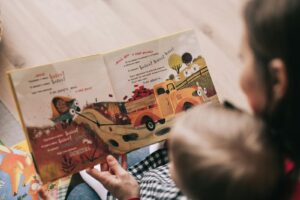Welcome, dear readers! Today, we want to share the importance of creating a literacy-rich environment for children. By surrounding our little ones with books, writing materials, and language-rich experiences, we can help them develop literacy skills from a young age. Together, let’s explore the benefits of fostering a love for reading and writing in our children and discover practical tips on creating a supportive environment for their literacy journey. Join us on this exciting adventure! Have you ever wondered how to make a literacy-rich environment for children? We are here to help! This article will explore the importance of literacy in a child’s early development and provide practical tips on fostering a love for reading and writing. Let’s dive in!
Why Literacy is Important for Children
Literacy is not just about reading and writing; it is a fundamental skill that sets the foundation for a child’s success in school and life. Children exposed to a literacy-rich environment from a young age are more likely to develop strong communication skills, critical thinking abilities, and a lifelong love for learning.
The Benefits of Literacy for Children
Literacy skills are crucial for academic achievement, social interaction, and well-being. Literate children are better equipped to express themselves, understand complex ideas, and navigate the world. Parents and educators can help children build a strong foundation for future success by fostering a love for literacy early on.
How to Create a Literacy-Rich Environment
Creating a literacy-rich environment for children does not have to be complicated. Incorporating simple and engaging activities into your daily routine can help children develop a love for reading and writing. Here are some practical tips to get you started:
Reading Aloud
Reading aloud to children is one of the most effective ways to promote literacy skills. Choose various age-appropriate books and set aside time to read to your child daily. Ask questions, encourage discussion, and make connections to real-life experiences to help children better understand and engage with the text.
Building a Home Library
Having a collection of books at home is essential for promoting literacy. Create a cozy reading nook in your child’s bedroom or shared family space and fill it with a diverse selection of books. Encourage children to choose books that interest them and revisit old favorites to instill a love for reading.
Writing Activities
Writing and reading are vital components of literacy development. Provide children with opportunities to write stories, letters, and journal entries. Encourage creativity and self-expression by praising children for their efforts and offering constructive feedback.
Word Games and Puzzles
Word games and puzzles are a fun way to reinforce literacy skills while engaging children in play. Incorporate games like Scrabble, crossword puzzles, and word searches into your family game nights to make learning enjoyable and interactive.
The Role of Technology in Literacy
In today’s digital age, technology plays a significant role in promoting literacy skills in children. While traditional forms of literacy are still essential, digital literacy is becoming increasingly important in preparing children for success in the 21st century. Here are some ways to leverage technology to foster literacy skills in children:
Educational Apps and Websites
Countless educational apps and websites are available to promote children’s literacy skills. Encourage children to explore these resources and engage in interactive activities reinforcing reading, writing, and language comprehension.
E-books and Audiobooks
E-books and audiobooks are convenient alternatives to traditional print books that can make reading more accessible and engaging for children. Consider incorporating digital books into your child’s reading routine to provide them with various literary experiences.
Parental Controls and Monitoring
Setting boundaries and monitoring children’s online activity is essential when allowing them to use technology for literacy activities. Utilize parental controls to restrict access to inappropriate content and ensure children engage with age-appropriate material.
Creating a Literacy-Rich Community
In addition to creating a literacy-rich environment at home, parents and educators can work together to build a literacy-rich community that supports children’s academic and social development. Here are some ways to involve the community in promoting literacy skills in children:
Partnering with Libraries
Libraries are valuable resources for promoting literacy in children. Partner with your local library to access a wide selection of books, participate in storytelling events, and engage in literacy programs tailored to your child’s interests and needs.
Joining Parent-Teacher Associations
Parent-Teacher Associations (PTAs) are an excellent way to get involved in your child’s education and advocate for school literacy initiatives. Attend PTA meetings, volunteer for literacy-related events, and collaborate with teachers to create a supportive learning environment for children.
Participating in Community Events
Community events such as book fairs, author visits, and literary festivals are great opportunities to expose children to the joys of reading and writing. Attend these events with your child to foster a love for literacy and connect with other families who share your passion for reading.
Conclusion
Creating a literacy-rich environment for children is essential for setting them up for success in school and life. Parents and educators can help children develop strong literacy skills and a love for learning by incorporating reading, writing, and technology into everyday activities. Remember to make literacy fun and engaging for children, and watch as their imaginations soar and their confidence grows. Together, we can create a world where every child has the opportunity to become a lifelong reader and writer.



